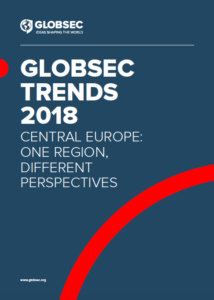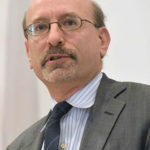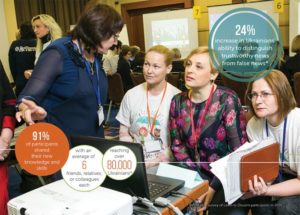 Are Russia’s disinformation efforts finally paying dividends in Central and Eastern Europe?
Are Russia’s disinformation efforts finally paying dividends in Central and Eastern Europe?
“The age of alternative facts and alternative realities has now reached Central Europe,” according to a new analysis. The region’s citizen’s still view the fall of communism in a positive light, but there is less agreement when assessing the quality of life before and after 1989, especially in Slovakia and Hungary, according to the Globsec Trends 2018 report.
“Feelings of post-communist nostalgia strongly resonate among the oldest segments of the region’s population,” the report adds:
Data from GLOBSEC Trends 2018 confirms that Central Europe is quite diverse and individual countries are moving in different directions. While 55% of Czechs and 56% of Slovaks have moved even further to the in-between position – neither siding with the East nor the West – Hungarians preference for the West has increased.
Surprisingly, Poles aged between 18 – 24 years are the least pro-Western youth. Only 27% would position their country in the West, compared to 57% of Czechs, 69% of Hungarians and 34% of Slovaks in the same age range. Poland nevertheless remains the region’s most vocal supporter of NATO, even if the gap in support between V4 states has narrowed.

Credit: CEPA
Three converging global trends have produced a new ‘golden age’ of political warfare, Daniel Kimmage (right), Acting Special Envoy and Coordinator at the State Department’s Global Engagement Center, told a forum at the Center for Strategic and International Studies.
Firstly, new communications technologies for delivering information allowed actors like Al Qaeda and ISIS to leverage social media to promote an otherwise marginal ideology. Secondly, the return of ideological competition has ended the liberal market democracies’ complacency. Thirdly, the revival of geopolitical competition, evident in the emergence of new revisionist powers, as highlighted in the US National Security Strategy.
The response to these new threats is necessarily long term – it took the West decades to respond to Soviet political warfare – and new institutions and research are needed to identify what works. For its part, the Global Engagement Center, established by Congress has three principal functions: analytical; support for partners – for example, through the Information Access Fund; and to coordinate USG efforts to counter disinformation and propaganda.
 “The West has lost its self-belief in democracy, allowing our enemies to use our confusion against us,” said Hanna Smith, Director of Strategic Planning and Responses at the Helsinki-based European Centre of Excellence for Countering Hybrid Threats. A “whole of society model” is need to build resilience, taking on board several key factors, she told the CSIS forum:
“The West has lost its self-belief in democracy, allowing our enemies to use our confusion against us,” said Hanna Smith, Director of Strategic Planning and Responses at the Helsinki-based European Centre of Excellence for Countering Hybrid Threats. A “whole of society model” is need to build resilience, taking on board several key factors, she told the CSIS forum:
- a world order marked by growing competition for status and resources;
- the changed character of warfare, including the difficulty of identifying the enemy;
- network-based action – the dark side of globalization – amplifies the power of formerly weak bad actors; and
- the younger post-Cold War generation finds it hard to accept that there’s a geopolitical threat.

It’s not enough to counter gray zone tactics: the West’s democracies need to advance a positive agenda and message, as the USIA did in the Cold War, said Ambassador Philip T. Reeker, Civilian Deputy to the Commander, U.S. European Command. A joint civil-military approach is needed, engaging partners and allies in, for instance, promoting media literacy, he told the CSIS forum.
Perhaps the best lab to test media literacy training is Ukraine, which has long been a target of fake news and is on the front line of the information wars, CSM adds.
The success of media literacy programs is often described in terms of number of people reached, rather than by how (or if) they actually change people’s behavior in the long run. It’s not even clear what metrics to judge them on. But a new report from a media literacy course run in Ukraine suggests that the program actually was able to change participants’ behavior — even 18 months after they’d completed the course, Nieman Lab reports.
 The program (right) was called Learn to Discern (L2D); it was run by global development and education nonprofit IREX with funding from the Canadian government and support from local organizations Academy of Ukrainian Press and StopFake (which Nieman Lab covered four years ago).
The program (right) was called Learn to Discern (L2D); it was run by global development and education nonprofit IREX with funding from the Canadian government and support from local organizations Academy of Ukrainian Press and StopFake (which Nieman Lab covered four years ago).
Social media is becoming the most important source of information for Central Europeans, having an impact comparable to that of television. However, social media also facilitates the broad dissemination of false information, and disinformation, the Globsec analysts suggest:
It comes as no surprise that many Central Europeans have fallen under the spell of conspiracy theories and fully support even the most outlandish ones. … Central Europeans have different experiences with disinformation spread on social media. However, a relative majority of social media users in all four countries have encountered inappropriate content on their social networks. Nevertheless, active reporting of such content to relevant authorities remains rare.
 The GLOBSEC Policy Institute’s bi-weekly overview of conventional and social media discourse in the Czech Republic, Hungary and Slovakia monitors propaganda and disinformation attempts, as well as democratic responses in the on-going information war.
The GLOBSEC Policy Institute’s bi-weekly overview of conventional and social media discourse in the Czech Republic, Hungary and Slovakia monitors propaganda and disinformation attempts, as well as democratic responses in the on-going information war.
This year’s GLOBSEC Trends also suggests that some Central Europeans are susceptible to conspiracy theories. For example, 40% of Slovaks believe that the United States supports terrorists in Syria and 52% think that Jews have too much power and secretly control many global organisations.
“Data from our public opinion polls show that conspiracy theories and disinformation narratives do not resonate only among the young or the uneducated, but Central Europeans of all age groups and with university degrees are susceptible to them,” said Katarina Klingova, Research Fellow of the Strategic Communication Programme.
In 2 out of 4 countries, most respondents encountered disinformation on social media. 60% of Hungarians and 52% of Czechs claim to have come across intentionally misleading or false information on their social media accounts. In addition, between 28% to 36% of Central Europeans do not have a social media account,” the Globsec report adds:
- The Czech Republic was the only CE country where a majority (67%) disagreed with the anti-Semitic conspiracy that Jews have too much power and secretly control many governments and institutions around the world. 96% of young Czechs disagree with this statement, the report notes:
- 83% of young Poles encountered disinformation on social media. 53% of young Polish social media users who encountered inappropriate content online reported it. Only 46% of Poles oppose the anti-Semitic conspiracy that Jews have too much power. However, 72% of Poles disagree with conspiracy theories concerning 9/11.
- 96% of young Czechs aged 18-24 years came across disinformation on social media.
- 68% of Slovaks aged 18-24 years encountered disinformation on social media. However, only 9% of all Slovak social media users who encounter inappropriate content report it.







